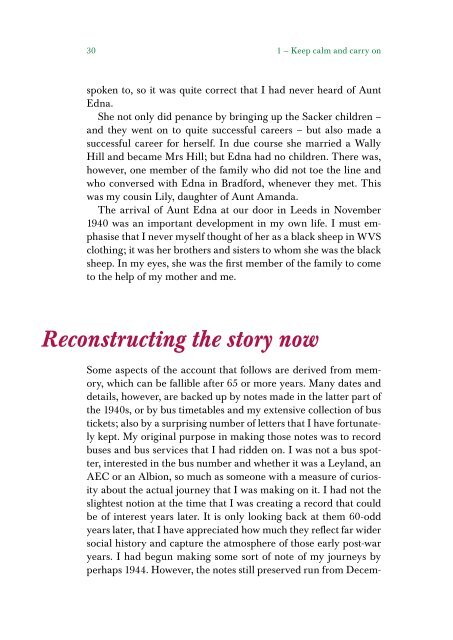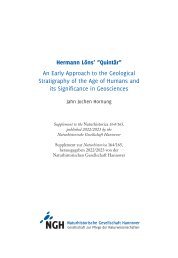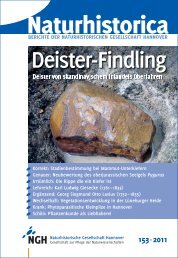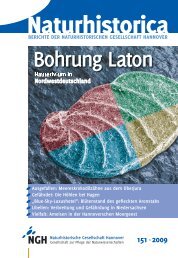Roger Atkinson - Blackout, Austerity and Pride
Blackout, Austerity and Pride – Life in the 1940s is a book written primarily from actual experience. It tells how an alert and intelligent boy, effectively orphaned at the age of 13, sets out to gain a foothold in life. Aided by some resourceful women, he unites a thirst for knowledge with a growing passion for places and buses and a strong sense of duty. http://www.memoir1940s.org.uk/
Blackout, Austerity and Pride – Life in the 1940s is a book written primarily from actual experience. It tells how an alert and intelligent boy, effectively orphaned at the age of 13, sets out to gain a foothold in life. Aided by some resourceful women, he unites a thirst for knowledge with a growing passion for places and buses and a strong sense of duty.
http://www.memoir1940s.org.uk/
Create successful ePaper yourself
Turn your PDF publications into a flip-book with our unique Google optimized e-Paper software.
30 1 — Keep calm <strong>and</strong> carry on<br />
spoken to, so it was quite correct that I had never heard of Aunt<br />
Edna.<br />
She not only did penance by bringing up the Sacker children –<br />
<strong>and</strong> they went on to quite successful careers – but also made a<br />
successful career for herself. In due course she married a Wally<br />
Hill <strong>and</strong> became Mrs Hill; but Edna had no children. There was,<br />
however, one member of the family who did not toe the line <strong>and</strong><br />
who conversed with Edna in Bradford, whenever they met. This<br />
was my cousin Lily, daughter of Aunt Am<strong>and</strong>a.<br />
The arrival of Aunt Edna at our door in Leeds in November<br />
1940 was an important development in my own life. I must emphasise<br />
that I never myself thought of her as a black sheep in WVS<br />
clothing; it was her brothers <strong>and</strong> sisters to whom she was the black<br />
sheep. In my eyes, she was the first member of the family to come<br />
to the help of my mother <strong>and</strong> me.<br />
Reconstructing the story now<br />
Some aspects of the account that follows are derived from memory,<br />
which can be fallible after 65 or more years. Many dates <strong>and</strong><br />
details, however, are backed up by notes made in the latter part of<br />
the 1940s, or by bus timetables <strong>and</strong> my extensive collection of bus<br />
tickets; also by a surprising number of letters that I have fortunately<br />
kept. My original purpose in making those notes was to record<br />
buses <strong>and</strong> bus services that I had ridden on. I was not a bus spotter,<br />
interested in the bus number <strong>and</strong> whether it was a Leyl<strong>and</strong>, an<br />
AEC or an Albion, so much as someone with a measure of curiosity<br />
about the actual journey that I was making on it. I had not the<br />
slightest notion at the time that I was creating a record that could<br />
be of interest years later. It is only looking back at them 60-odd<br />
years later, that I have appreciated how much they reflect far wider<br />
social history <strong>and</strong> capture the atmosphere of those early post-war<br />
years. I had begun making some sort of note of my journeys by<br />
perhaps 1944. However, the notes still preserved run from Decem-


















